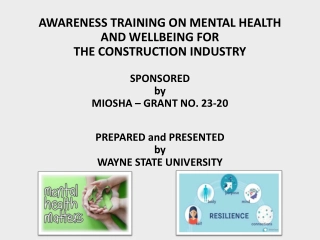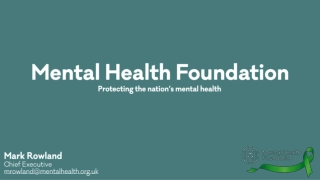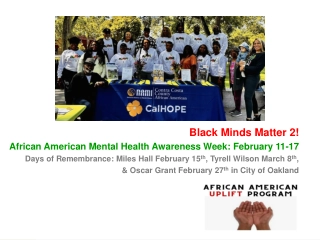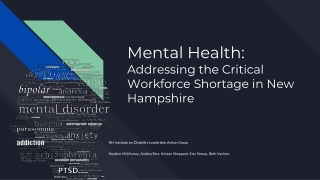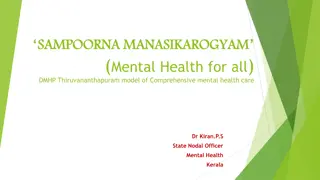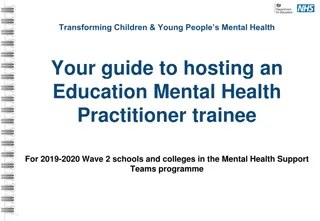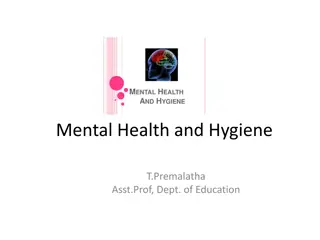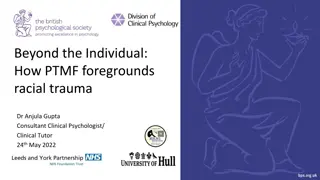
Mental Health Through a Spiritual Lens
Explore the intersection of spirituality and mental health, uncovering the significance of one's relationship with God and the theological implications of mental well-being. Delve into personal stories, stigma surrounding mental health, and the challenges individuals face, offering a unique perspective on healing and understanding.
Download Presentation

Please find below an Image/Link to download the presentation.
The content on the website is provided AS IS for your information and personal use only. It may not be sold, licensed, or shared on other websites without obtaining consent from the author. If you encounter any issues during the download, it is possible that the publisher has removed the file from their server.
You are allowed to download the files provided on this website for personal or commercial use, subject to the condition that they are used lawfully. All files are the property of their respective owners.
The content on the website is provided AS IS for your information and personal use only. It may not be sold, licensed, or shared on other websites without obtaining consent from the author.
E N D
Presentation Transcript
Spirituality and Spirituality and Mental Health Mental Health
Shalom Righteousness, holiness, right relationship with God What do we mean by mental health?
Healing and Curing Healing and Curing
Mental Health: Theological and Spiritual Mental Health: Theological and Spiritual Implications Implications Mental health is not the absence of anything; it is the presence of God Mental health is not an ideal, a concept or a goal, it is a relationship Mental health is a theological concept The presence of God is often revealed through human relationships
Mental health Mental health challenges are challenges are disruptions to disruptions to people s stories: people s stories: Allen s story
I am not Schizophrenia ...
Stigma Stigma "it's not who I am it's how you see me"
Spiritual Spiritual stigma: stigma: Glenda s story Glenda s story
Casual Theodicy and dangerous truth Casual Theodicy and dangerous truth telling telling I ve had some really bad experiences. Once when I was in the emergency room I felt so depressed I was seriously thinking about killing myself. I asked for a chaplain, and I said to him, could I be is it possible that I m possessed by the devil? And he was like, I really don t know, which was like, kind of a horrible thing for him to say, I just thought maybe he should have been like no! But I don t know, I guess the answer was maybe?, but that was pretty negative. Not the kind of truth I wanted to hear.
Abandoning Christians Abandoning Christians I ve decided that if this happens again and I m sure it will, especially if I get psychotic, religious and depressed - that I won t talk to anyone religious ... Because I guess you guys (I m including you (JS) as a religious person) feel the need to honestly answer questions. I don t know how people are trained to be chaplains with people in mental distress, but that experience of that person was just terrible. Even if he thought that, that was not the right thing to say. You just have to be really careful not to invalidate people s experiences. I mean if someone was suicidal and they think they re possessed by the devil it might be best not to not reinforce that even if you believe it! You could just say don t worry about that, you re going to be fine.
Practising Healing Scripture Liturgy Community
Scriptural healing: Developing a mental health hermeneutic
Richard Baxter o n the blessings of not reading the bible. Meditation is not a duty at all for a melancholy person, except for the few that are able to tolerate a brief, structured sort of meditation. This must be on something furthest from the matter that troubles them, except for short meditations like sudden, spontaneous prayers said out loud. A rigid and protracted meditation will only frustrate and disturb you, and render you unable to perform other duties. If a man has a broken leg, he must not walk on it until it is set, or the whole body will suffer. It is your thinking faculty or your imagination that is the broken, hurting part. Therefore, you must not use it to reflect upon the things that so trouble you.
The problem with worship The problem with worship But it was also difficult because our church is also charismatic, evangelical. And so there s a lot of happy- clappy-ness, which when you re depressed and crying is just awful. Yeah, yeah. But I mean Sundays in church were excruciating, just turn up, worship, listen to the preacher and then run away. Or cry during the ministry time. Just dealing with people was so overwhelming
Lament and authenticity Lament and authenticity But thankfully our worship leader is, he s a guy who really believes in let s have worship which talks about how rotten life can be. Which I really like. And so while this happy-clappy-ness, he ll often be a Sunday of lament where we ll all just wail and go life is awful! Which really freed me up. It was incredibly helpful
Holding joy for others Holding joy for others But then saying that, actually it was also really helpful to be in a congregation of people who were still worshipping God, still being happy-clappy, still being hopeful when I was just like this, I just can t do this. Because it meant they were like well you can t do it, but we can do it for you. Which I just really appreciated. People would be standing alongside me in prayer like during the worship time they d have a hand on my shoulder while they were just fully, singing, worshipping and rejoicing. And I was just a wreck, crying, but I found that incredibly profound because it s that sense of someone s willing to be alongside me, and yet they were not forgetting the truth that I couldn t grab a hold of at that point.
Creating liturgies that heal
My colleague developed an entire liturgy for people with depression. The church had never identified mental health directly, but because he named the fact that many people in the church lived with depression, he brought out the issue. He wrote a beautiful service using Scripture, candles, anointing with oil, prayers that he wrote specifically for people with depression. And I think things like that go a long way to making people with mental illness feel welcome in a congregation.
A strange kind of loneliness
Love is Listening

